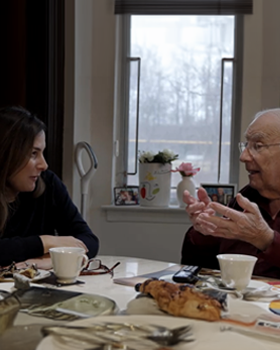May 1, 2024
The Last Ones Connects Holocaust Survivors to the Next Generations

The Last Ones, a multidimensional project incorporating video, podcasts, books and more, received a Federation grant to further its mission of creating a link between the last living Holocaust Survivors and younger generations. Launched in 2017 by journalists Leslie Benitah and Sophie Nahum, the dynamic venture has filmed more than 180 Survivors. “We realize it’s a race against time,” said Benitah, the granddaughter of four Survivors who is currently a Federation Board member, “and we feel strongly about capturing as many life histories as possible.”
Nahum films Survivor videos mainly in France, where both women were born and where the project began, while Benitah, based in Miami, covers everyplace else, including the US, Canada, South America and beyond. “We need to keep these stories alive,” asserted Benitah. “In France, I grew up with the Holocaust all around me.” But now, she noted, there are fewer and fewer Survivors and, therefore, considerably fewer opportunities for younger generations to learn from them. In addition, studies from ADL’s Center for Antisemitism Research suggest a direct correlation between Holocaust education — which provides lessons in empathy and the role of Nazi Germany in fostering hate — and combatting antisemitism.
What distinguishes videos produced by The Last Ones, or Les Derniers in French, from the thousands of archived Survivor accounts that already exist is their brevity and accessibility. The Archive of the Shoah Foundation has 55,000 Survivor videos for viewing, but they are lengthy and challenging for young people to access and sit through. “They’re for historians,” noted Benitah. The Last Ones videos average 15 minutes in length and can be readily streamed for free online, with subtitled testimonies in French, English and Spanish. “The idea is for people to hear it in their own language,” she explained.
The Last Ones is succeeding in reaching young people through a variety of platforms, such as TikTok, where it has millions of views. Said Benitah, “Those who don’t know [about the Holocaust] are at least getting a bit of knowledge in 30 seconds.” Its videos are shown at schools and, when possible, with a Survivor present to answer questions. Currently there are close to 10 videos of Survivors living in Miami. And there will soon be The Last Ones geo-located app, which will supplement visits to Holocaust sites with relevant Survivor testimonies. Benitah explained, “Users will walk by the Holocaust Memorial Miami Beach, and see two or three Survivors popping up [as icons within the app for users to stream their stories].”
Nahum and Benitah spend hours filming each Survivor before the video is edited down to an easily digested 15 minutes. “I bring babka,” mused Benitah, “and they make me tea…” and the camaraderie becomes part of the film. Thus, she insisted, there is no way anyone could confuse their product with AI. “It’s too personal, too warm.” The Last Ones is clearly as much a labor of love as it is a fervent mission. “As long as we keep finding Survivors with stories to tell,” she added, “we have to keep going.”
To learn more about The Last Ones, visit their website here.







